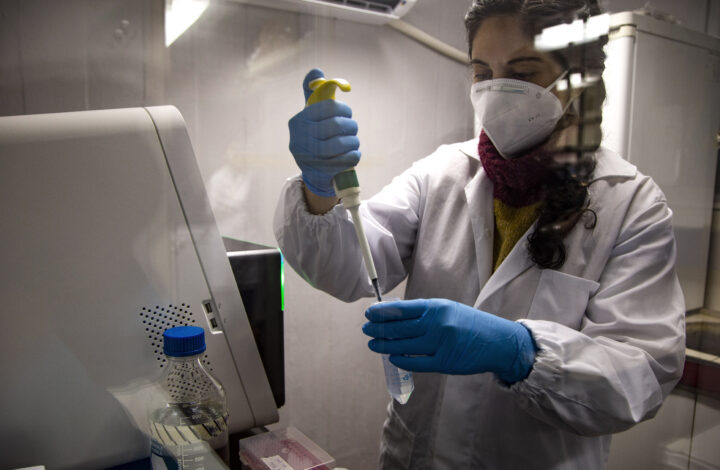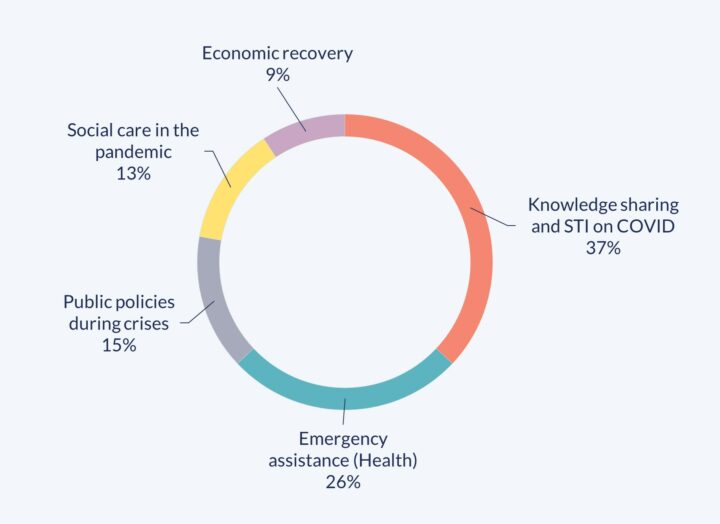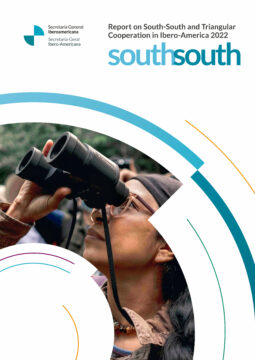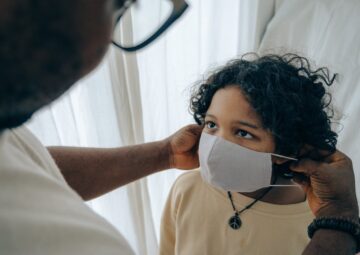Bilateral SSC as an instrument to respond to the COVID-19 crisis
In the 2020-2021 period, 8.2% of the Bilateral SSC in Ibero-America attended the fight against the pandemic.

The COVID-19 pandemic, which began in 2020, has triggered a global crisis that is not only health-related, but multidimensional. Apart from the negative consequences it has had on the lives of many people worldwide, it has taught us a lesson: global challenges need global responses. In this sense, Bilateral South-South Cooperation has been one of the available instruments countries counted with to jointly and horizontally face the crisis.
In the 2020-2021 period, 54 bilateral initiatives were implemented in Ibero-America as a direct response to COVID-19: 38 actions and 16 projects, representing 8.2% of all Bilateral SSC in the region during the period.
The following graph distributes these 54 initiatives according to the addressed topics. Thus, most of the initiatives promoted (20, i.e. 37%) involved exchanges of knowledge, science, technology and innovation (STI) on the virus. Exchanges that focused on therapies and treatments to deal with the disease, epidemiological strategies (such as those related to prevention and control), and research on vaccines are especially worthy of mention.
These were closely followed (14 initiatives) by emergency aid, which included donations of medicines, supplies and equipment to face the pandemic. Equally important were the initiatives that focused on public policies in the context of crisis (another 15%), which made it possible to address, for example, best practices for elections, the generation of data and information to improve follow-up and monitoring, in addition to those related to the management of public budgets adapted to the crisis.
Likewise, 7 actions and projects (13%) were dedicated to “Social care in the pandemic”, among which those dealing with mental health, ergonomics for the new working conditions imposed by the so-called “new normality”, care for the elderly and social protection, including others, should be highlighted.
Finally, initiatives of a different profile (the last 9%) were identified towards the end of 2020, as a result of, on the one hand, the gradual elimination of the restrictions on mobility and, on the other, the need to address problems derived from COVID-19 but of a different nature, such as economic and employment recovery, as well as the revitalization of trade and business, especially focused on small and medium-sized enterprises.
Thematic categorization of Bilateral SSC initiatives in Ibero-America that addressed the fight against COVID-19. 2020-2021.
In percentage

Source: SEGIB based on Agencies and Directorates-General for Cooperation.
Chile (21 actions and 2 projects in the provider role) and Cuba (12 actions) were the two most important providers, accounting for almost two thirds of the total number of initiatives registered in response to COVID-19. Chile’s initiatives were mainly based on international courses aimed at multiple countries (usually online due to mobility restrictions); Cuba, in turn, implemented direct actions to fight against COVID-19.
Another large group of initiatives was promoted under a bidirectional dynamic, in which countries acted as providers and as recipients at the same time. This was possible, partially, because both partners shared a bilateral cooperation instrument that was “reshaped” to provide a more agile response to the challenges the pandemic imposed. Specifically, Mexico and Chile, through their Mixed Fund, executed 7 projects – mainly joint studies and research. Mexico and Uruguay, also through their joint fund, implemented 3 projects that facilitated the donation of supplies and equipment, as well as the exchange of experiences in terms of epidemiological strategies. Argentina and Chile, in this specific case and without an instrument, promoted 3 projects to provide a collaborative response to the pandemic and promote economic recovery.
Thirdly, as for initiatives received (22 out of 54), in most cases several countries simultaneously shared the recipient role and this occurred in 60% of the non-bidirectional initiatives. This was a dynamic on which, for example, online courses and training were based.
All the above reveals bilateral initiatives to respond to the pandemic were diverse, as were countries’ needs in this period. Bilateral SSC proved to be a useful instrument to deal with the crisis.
April 2023
***
Methodological note: The Ibero-American Integrated Data System on South-South and Triangular Cooperation (SIDICSS by its Spanish acronym) was used to carry out this exercise. On this basis, a search was performed using keywords related to COVID-19. Initiatives that had not begun in 2020 or 2021 were removed as well as those that were not related to the pandemic. The resulting initiatives were then classified into thematic categories related to the multidimensional attention to the COVID-19 crisis.
Source: SEGIB based on Agencies and Directorates-General for Cooperation.
Photograph: Bilateral SSC project between Mexico and Uruguay: “Development and application of biotechnological tools in animal health for the implementation of a research network on viral diseases affecting commercial poultry farming”. Image bank on South‑South and Triangular Cooperation in Ibero‑America. SEGIB‑PIFCSS. 2021.


